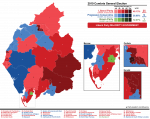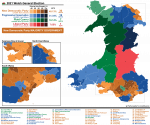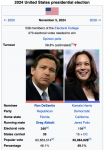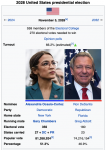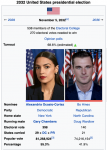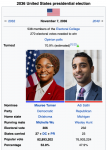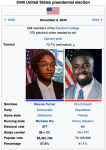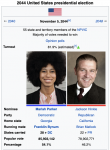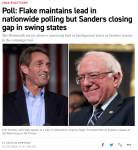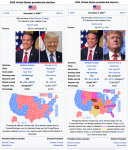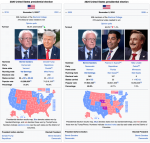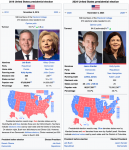Blackentheborg
Dennis Skinner's molotov
- Location
- Grand Hotel Abyss
- Pronouns
- He/Him

Theodore Robert "Ted" Bundy (born Cowell; November 24, 1946 – January 24, 1989) was an American politician, former nominee for vice president and serial killer who kidnapped, raped, and murdered hundreds of young women during the 1970s and 1980s, many during his terms as Attorney General and Senator for the state of Washington. His trial and conviction during his time as running mate for George H.W. Bush's presidential campaign is largely credited as the primary cause for Jesse Jackson's electoral victory in the 1988 election.
Regarded as charismatic and handsome by those who knew him, Bundy held many minor yet crucial positions in both state and national politics. In 1968, while acting as a driver & bodyguard for Lt. Gubernatorial candidate Arthur Fletcher, Bundy was drafted as a Republican National Convention delegate for Nelson Rockefeller. After working for some years as a Suicide Hotline Crisis worker and earning a Juris Doctor degree at the University of Puget Sound, he worked for the campaign of future Governor Daniel J. Evans, acquiring sensitive campaign strategy by way of infiltrating rallies of Evans' opponent, Democrat Albert Rosellini. In recognition, Evans appointed Bundy first as assistant to Ross Davis, Chairman of the Washington State Republican Party, then as Director of the Seattle Crime Prevention Advisory Committee. It is believed that Bundy used his position as Director to not only coordinate his crimes by targeting at-risk citizens (entirely women, his preferred victim type) but use the resources to cover up evidence of his involvement. In this time alone, Bundy admitted to at least fifty murders committed between 1974 and 1978, and is accused of twenty more related disappearances and attacks.
Bundy ran for and was successfully elected as State Attorney General. His personal, more conservative views often ran counter to Governor John Spellman, a fellow Republican, who was a social and economic moderate. As his stances raised his national profile, Bundy easily won the Republican nomination to replace the late Senator Henry M. Jackson, who had died following a sudden aortic aneurysm. During the campaign, Bundy used his charisma to hammer home how he wasn't "some share the wealth type of pinko creep" but someone who championed "true, real American values". He won handily over his opponent, Democratic Representative Mike Lowry, in the general election. During his term in the senate, Bundy developed a reputation as a fiscal conservative and somewhat social moderate, holding a strong hostility towards increases in federal spending and often called for reductions in taxes. While considered a rising star on the national stage, testimony by congressional aides at the time report Bundy was not happy as a U.S. Senator; he had occasionally indicated he held aspirations to become Governor instead. During this time, Bundy continued his murder spree, tho in more sporadic fashion, admitting to perpetrating only seventeen murders between the 1983 special election and his 1988 nomination, two of which were committed during a speaking tour in Utah. Modern political scholars usually ascribe Bundy's unhappiness to his new Senate position getting in the way of furthering his killing spree.
On August 16, 1988, at the Republican convention in New Orleans, Louisiana, George H. W. Bush chose Bundy to be his running mate in the 1988 United States presidential election. The choice immediately became controversial, owing to Bundy's young age and perceived inexperience, owing to his single term in congress. During the Vice Presidential debate with Democratic nominee Lloyd Bentsen, Bundy compared the length of his congressional service with that of President John F. Kennedy, who held less experience than his rivals during the 1960 presidential nomination. Bentsen's response - "I served with Jack Kennedy. I knew Jack Kennedy. Jack Kennedy was a friend of mine. Senator, you're no Jack Kennedy" - led to thunderous applause from the debate audience and a temporary dip in polling for the Bush campaign. While no evidence was found to link it to his movements, the subsequent disappearance of Tina Bentsen-Smith, Bentsen's adopted daughter, is largely believed to be perpetrated by Bundy in retribution in the court of public opinion.
In the months leading up to general election, sordid details began to emerge about Bundy's past; homicide detective Robert D. Keppel linked him to several murders that took place in the state of Washington, which was later corroborated by investigators from Seattle and King County. Bundy was interviewed but cleared as a suspect in 1978. Further scrutiny came when the New York Times uncovered a composite sketch circulated by King County police in 1974 regarding a broad daylight abduction at a crowded beach in Issaquah, one which bore startling resemblance to Bundy. The Jackson campaign, as well as Democratic Party leaders in congress, called for him to be investigated. Bundy and the Bush campaign vehemently denied the accusations, accusing the Jackson campaign of attacking his character with circumstantial evidence. Campaign manager Lee Atwater urged Bush to drop Bundy from the ticket, but this was decided against due to the election's close proximity. Two weeks prior to election day, however, Bundy was indicted after eight women made statements to The Seattle Times alleging that Bundy had attempted various acts of assault and abduction. In custody, Bundy admitted to not only the accused assault, but a number of other murders. The exact reasoning behind his admission was unknown, but the revelation that the Vice Presidential candidate had possibly murdered hundreds and engaged in acts of necrophilia resulted in Bush losing the Presidential election to Jackson in November.
Last edited:




